Prioritized Nursing Interventions for Evelyn Hansen's Health Issues
VerifiedAdded on 2021/02/19
|6
|2092
|129
Report
AI Summary
This report presents a nursing case study focusing on a 65-year-old woman, Evelyn Hansen, admitted to the hospital with hyperglycemia, dehydration, and a history of depression and diabetes. The report identifies and prioritizes three key health issues: hyperglycemia, dehydration, and diabetes management knowledge. Hyperglycemia is ranked as the top priority due to its life-threatening potential and its exacerbation of dehydration. Dehydration is the second priority, linked to a urinary tract infection and fluid loss, which can worsen diabetes. Diabetes management knowledge is the third priority, essential for long-term patient stability and improved clinical outcomes. The report details the crucial role of nurses in addressing these issues through assessment, coordination of care, provision of care, and adherence to nursing standards, emphasizing the importance of monitoring, communication, and clinical governance to ensure optimal patient outcomes. The report concludes with a list of relevant references used for the analysis and recommendations.
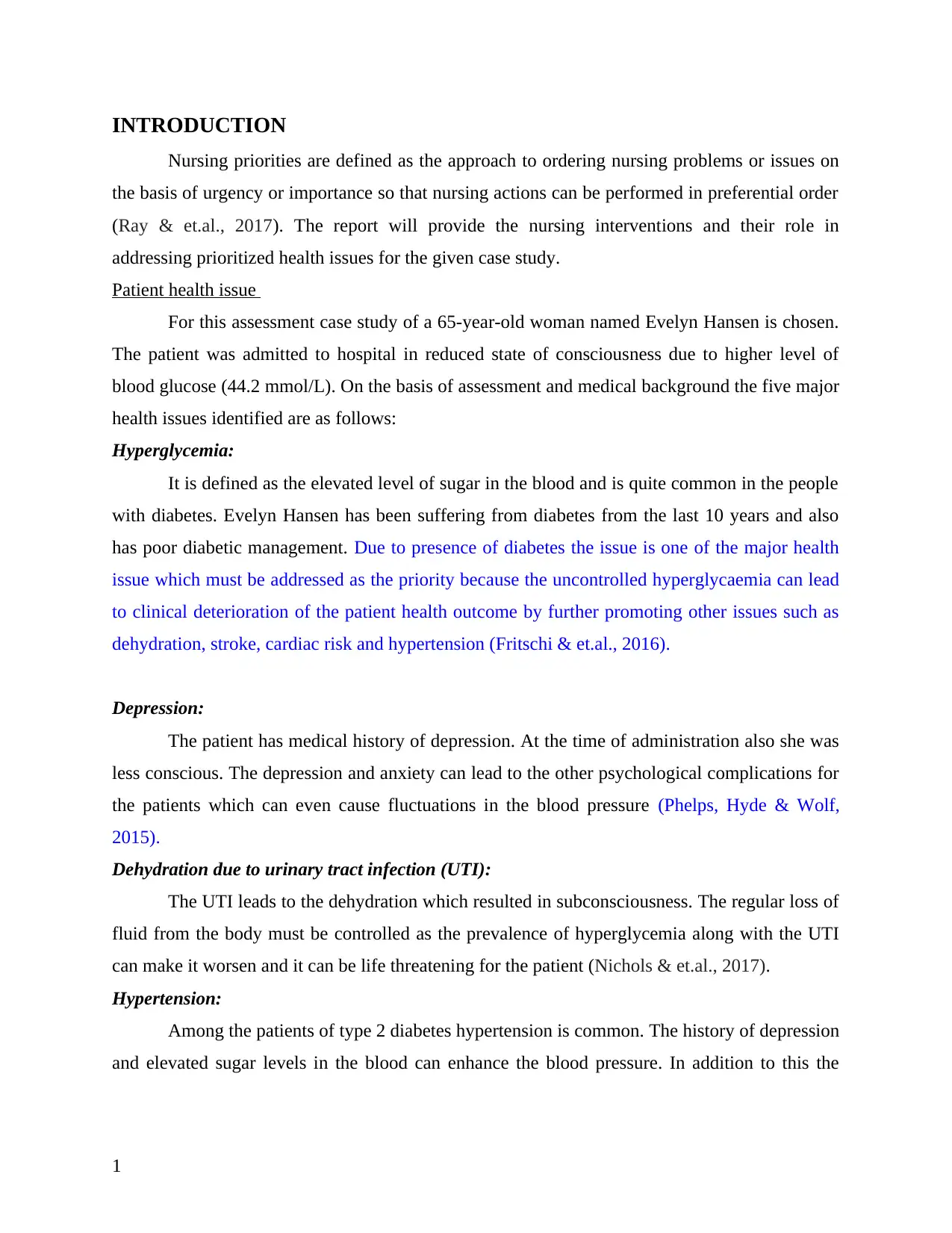
INTRODUCTION
Nursing priorities are defined as the approach to ordering nursing problems or issues on
the basis of urgency or importance so that nursing actions can be performed in preferential order
(Ray & et.al., 2017). The report will provide the nursing interventions and their role in
addressing prioritized health issues for the given case study.
Patient health issue
For this assessment case study of a 65-year-old woman named Evelyn Hansen is chosen.
The patient was admitted to hospital in reduced state of consciousness due to higher level of
blood glucose (44.2 mmol/L). On the basis of assessment and medical background the five major
health issues identified are as follows:
Hyperglycemia:
It is defined as the elevated level of sugar in the blood and is quite common in the people
with diabetes. Evelyn Hansen has been suffering from diabetes from the last 10 years and also
has poor diabetic management. Due to presence of diabetes the issue is one of the major health
issue which must be addressed as the priority because the uncontrolled hyperglycaemia can lead
to clinical deterioration of the patient health outcome by further promoting other issues such as
dehydration, stroke, cardiac risk and hypertension (Fritschi & et.al., 2016).
Depression:
The patient has medical history of depression. At the time of administration also she was
less conscious. The depression and anxiety can lead to the other psychological complications for
the patients which can even cause fluctuations in the blood pressure (Phelps, Hyde & Wolf,
2015).
Dehydration due to urinary tract infection (UTI):
The UTI leads to the dehydration which resulted in subconsciousness. The regular loss of
fluid from the body must be controlled as the prevalence of hyperglycemia along with the UTI
can make it worsen and it can be life threatening for the patient (Nichols & et.al., 2017).
Hypertension:
Among the patients of type 2 diabetes hypertension is common. The history of depression
and elevated sugar levels in the blood can enhance the blood pressure. In addition to this the
1
Nursing priorities are defined as the approach to ordering nursing problems or issues on
the basis of urgency or importance so that nursing actions can be performed in preferential order
(Ray & et.al., 2017). The report will provide the nursing interventions and their role in
addressing prioritized health issues for the given case study.
Patient health issue
For this assessment case study of a 65-year-old woman named Evelyn Hansen is chosen.
The patient was admitted to hospital in reduced state of consciousness due to higher level of
blood glucose (44.2 mmol/L). On the basis of assessment and medical background the five major
health issues identified are as follows:
Hyperglycemia:
It is defined as the elevated level of sugar in the blood and is quite common in the people
with diabetes. Evelyn Hansen has been suffering from diabetes from the last 10 years and also
has poor diabetic management. Due to presence of diabetes the issue is one of the major health
issue which must be addressed as the priority because the uncontrolled hyperglycaemia can lead
to clinical deterioration of the patient health outcome by further promoting other issues such as
dehydration, stroke, cardiac risk and hypertension (Fritschi & et.al., 2016).
Depression:
The patient has medical history of depression. At the time of administration also she was
less conscious. The depression and anxiety can lead to the other psychological complications for
the patients which can even cause fluctuations in the blood pressure (Phelps, Hyde & Wolf,
2015).
Dehydration due to urinary tract infection (UTI):
The UTI leads to the dehydration which resulted in subconsciousness. The regular loss of
fluid from the body must be controlled as the prevalence of hyperglycemia along with the UTI
can make it worsen and it can be life threatening for the patient (Nichols & et.al., 2017).
Hypertension:
Among the patients of type 2 diabetes hypertension is common. The history of depression
and elevated sugar levels in the blood can enhance the blood pressure. In addition to this the
1
Paraphrase This Document
Need a fresh take? Get an instant paraphrase of this document with our AI Paraphraser
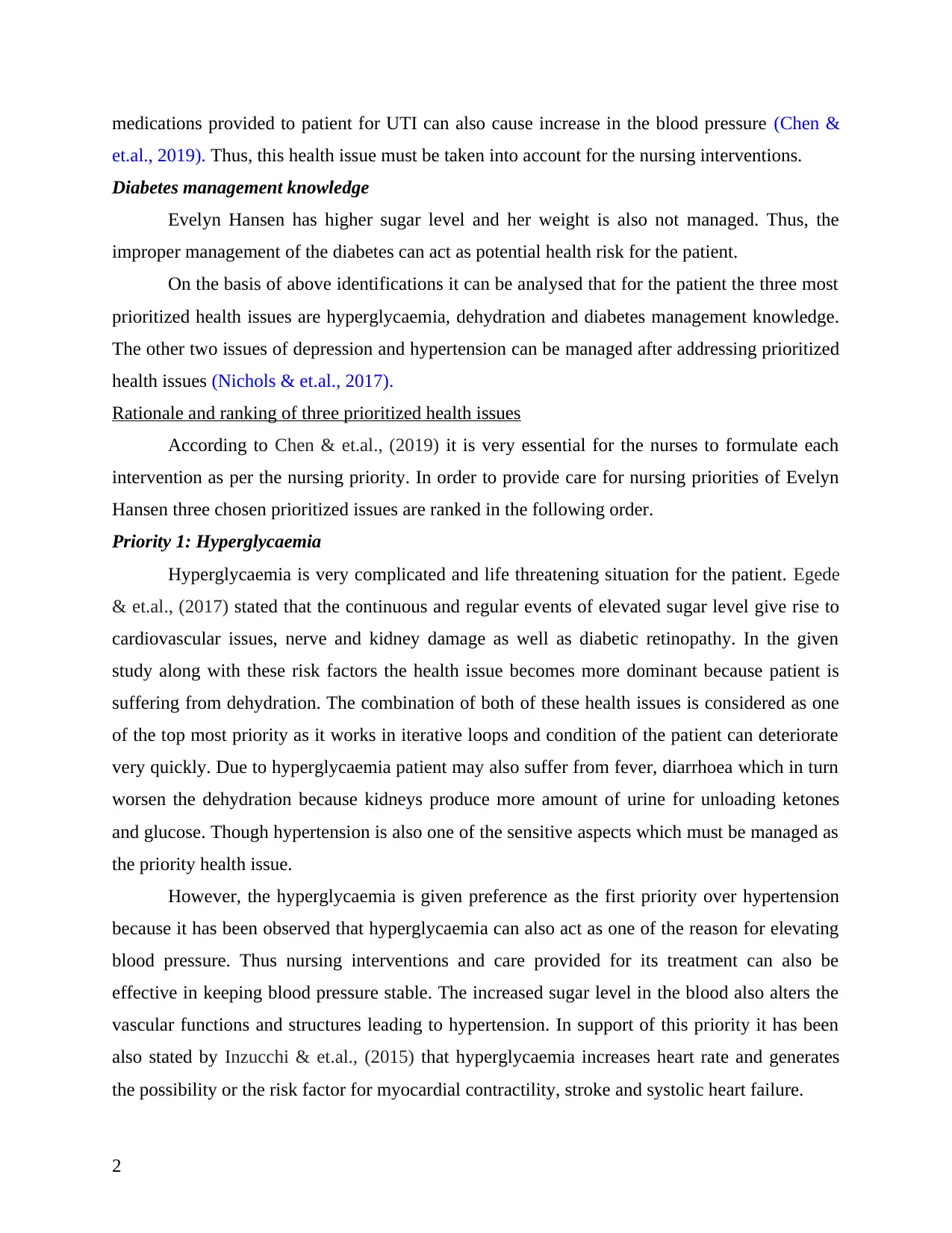
medications provided to patient for UTI can also cause increase in the blood pressure (Chen &
et.al., 2019). Thus, this health issue must be taken into account for the nursing interventions.
Diabetes management knowledge
Evelyn Hansen has higher sugar level and her weight is also not managed. Thus, the
improper management of the diabetes can act as potential health risk for the patient.
On the basis of above identifications it can be analysed that for the patient the three most
prioritized health issues are hyperglycaemia, dehydration and diabetes management knowledge.
The other two issues of depression and hypertension can be managed after addressing prioritized
health issues (Nichols & et.al., 2017).
Rationale and ranking of three prioritized health issues
According to Chen & et.al., (2019) it is very essential for the nurses to formulate each
intervention as per the nursing priority. In order to provide care for nursing priorities of Evelyn
Hansen three chosen prioritized issues are ranked in the following order.
Priority 1: Hyperglycaemia
Hyperglycaemia is very complicated and life threatening situation for the patient. Egede
& et.al., (2017) stated that the continuous and regular events of elevated sugar level give rise to
cardiovascular issues, nerve and kidney damage as well as diabetic retinopathy. In the given
study along with these risk factors the health issue becomes more dominant because patient is
suffering from dehydration. The combination of both of these health issues is considered as one
of the top most priority as it works in iterative loops and condition of the patient can deteriorate
very quickly. Due to hyperglycaemia patient may also suffer from fever, diarrhoea which in turn
worsen the dehydration because kidneys produce more amount of urine for unloading ketones
and glucose. Though hypertension is also one of the sensitive aspects which must be managed as
the priority health issue.
However, the hyperglycaemia is given preference as the first priority over hypertension
because it has been observed that hyperglycaemia can also act as one of the reason for elevating
blood pressure. Thus nursing interventions and care provided for its treatment can also be
effective in keeping blood pressure stable. The increased sugar level in the blood also alters the
vascular functions and structures leading to hypertension. In support of this priority it has been
also stated by Inzucchi & et.al., (2015) that hyperglycaemia increases heart rate and generates
the possibility or the risk factor for myocardial contractility, stroke and systolic heart failure.
2
et.al., 2019). Thus, this health issue must be taken into account for the nursing interventions.
Diabetes management knowledge
Evelyn Hansen has higher sugar level and her weight is also not managed. Thus, the
improper management of the diabetes can act as potential health risk for the patient.
On the basis of above identifications it can be analysed that for the patient the three most
prioritized health issues are hyperglycaemia, dehydration and diabetes management knowledge.
The other two issues of depression and hypertension can be managed after addressing prioritized
health issues (Nichols & et.al., 2017).
Rationale and ranking of three prioritized health issues
According to Chen & et.al., (2019) it is very essential for the nurses to formulate each
intervention as per the nursing priority. In order to provide care for nursing priorities of Evelyn
Hansen three chosen prioritized issues are ranked in the following order.
Priority 1: Hyperglycaemia
Hyperglycaemia is very complicated and life threatening situation for the patient. Egede
& et.al., (2017) stated that the continuous and regular events of elevated sugar level give rise to
cardiovascular issues, nerve and kidney damage as well as diabetic retinopathy. In the given
study along with these risk factors the health issue becomes more dominant because patient is
suffering from dehydration. The combination of both of these health issues is considered as one
of the top most priority as it works in iterative loops and condition of the patient can deteriorate
very quickly. Due to hyperglycaemia patient may also suffer from fever, diarrhoea which in turn
worsen the dehydration because kidneys produce more amount of urine for unloading ketones
and glucose. Though hypertension is also one of the sensitive aspects which must be managed as
the priority health issue.
However, the hyperglycaemia is given preference as the first priority over hypertension
because it has been observed that hyperglycaemia can also act as one of the reason for elevating
blood pressure. Thus nursing interventions and care provided for its treatment can also be
effective in keeping blood pressure stable. The increased sugar level in the blood also alters the
vascular functions and structures leading to hypertension. In support of this priority it has been
also stated by Inzucchi & et.al., (2015) that hyperglycaemia increases heart rate and generates
the possibility or the risk factor for myocardial contractility, stroke and systolic heart failure.
2
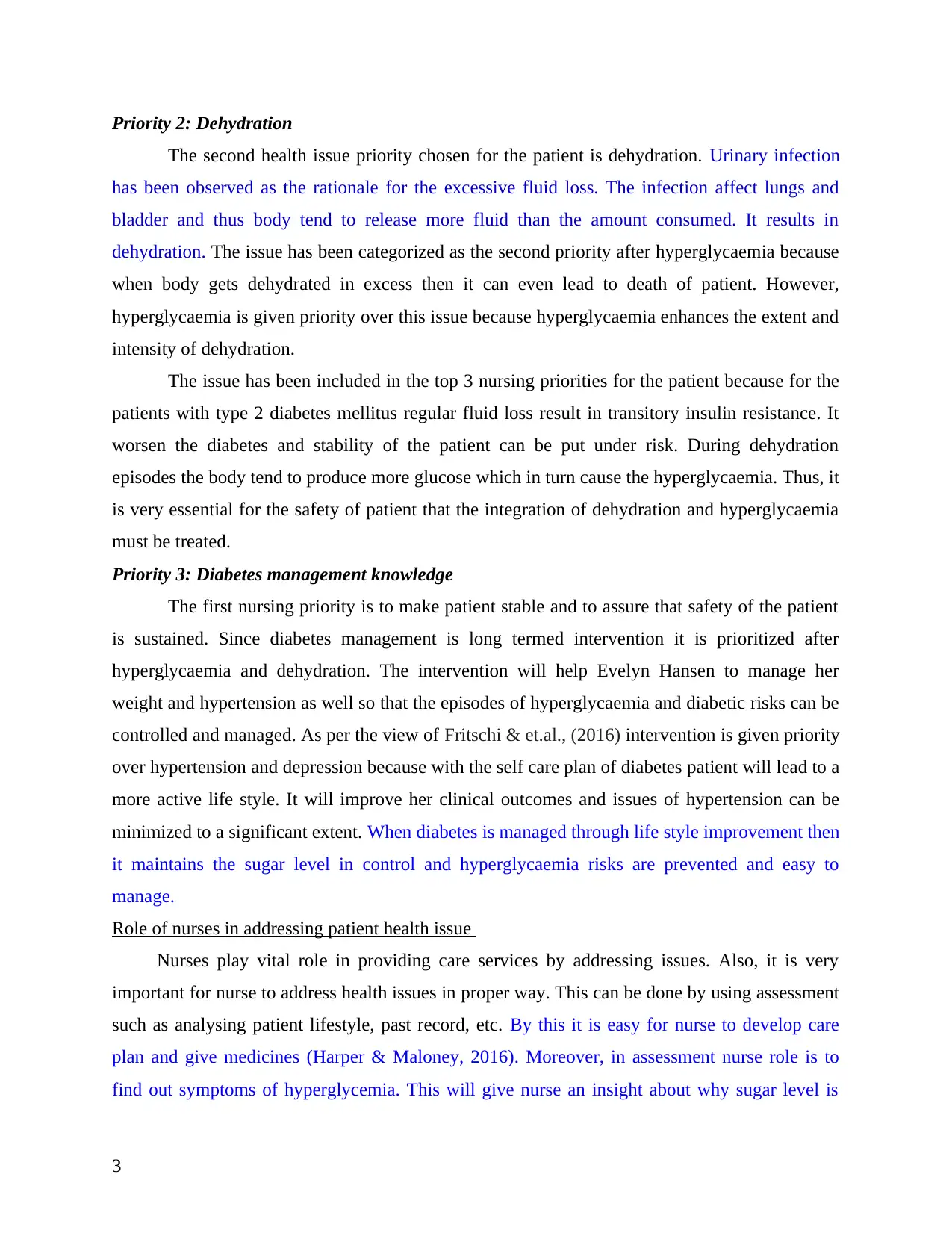
Priority 2: Dehydration
The second health issue priority chosen for the patient is dehydration. Urinary infection
has been observed as the rationale for the excessive fluid loss. The infection affect lungs and
bladder and thus body tend to release more fluid than the amount consumed. It results in
dehydration. The issue has been categorized as the second priority after hyperglycaemia because
when body gets dehydrated in excess then it can even lead to death of patient. However,
hyperglycaemia is given priority over this issue because hyperglycaemia enhances the extent and
intensity of dehydration.
The issue has been included in the top 3 nursing priorities for the patient because for the
patients with type 2 diabetes mellitus regular fluid loss result in transitory insulin resistance. It
worsen the diabetes and stability of the patient can be put under risk. During dehydration
episodes the body tend to produce more glucose which in turn cause the hyperglycaemia. Thus, it
is very essential for the safety of patient that the integration of dehydration and hyperglycaemia
must be treated.
Priority 3: Diabetes management knowledge
The first nursing priority is to make patient stable and to assure that safety of the patient
is sustained. Since diabetes management is long termed intervention it is prioritized after
hyperglycaemia and dehydration. The intervention will help Evelyn Hansen to manage her
weight and hypertension as well so that the episodes of hyperglycaemia and diabetic risks can be
controlled and managed. As per the view of Fritschi & et.al., (2016) intervention is given priority
over hypertension and depression because with the self care plan of diabetes patient will lead to a
more active life style. It will improve her clinical outcomes and issues of hypertension can be
minimized to a significant extent. When diabetes is managed through life style improvement then
it maintains the sugar level in control and hyperglycaemia risks are prevented and easy to
manage.
Role of nurses in addressing patient health issue
Nurses play vital role in providing care services by addressing issues. Also, it is very
important for nurse to address health issues in proper way. This can be done by using assessment
such as analysing patient lifestyle, past record, etc. By this it is easy for nurse to develop care
plan and give medicines (Harper & Maloney, 2016). Moreover, in assessment nurse role is to
find out symptoms of hyperglycemia. This will give nurse an insight about why sugar level is
3
The second health issue priority chosen for the patient is dehydration. Urinary infection
has been observed as the rationale for the excessive fluid loss. The infection affect lungs and
bladder and thus body tend to release more fluid than the amount consumed. It results in
dehydration. The issue has been categorized as the second priority after hyperglycaemia because
when body gets dehydrated in excess then it can even lead to death of patient. However,
hyperglycaemia is given priority over this issue because hyperglycaemia enhances the extent and
intensity of dehydration.
The issue has been included in the top 3 nursing priorities for the patient because for the
patients with type 2 diabetes mellitus regular fluid loss result in transitory insulin resistance. It
worsen the diabetes and stability of the patient can be put under risk. During dehydration
episodes the body tend to produce more glucose which in turn cause the hyperglycaemia. Thus, it
is very essential for the safety of patient that the integration of dehydration and hyperglycaemia
must be treated.
Priority 3: Diabetes management knowledge
The first nursing priority is to make patient stable and to assure that safety of the patient
is sustained. Since diabetes management is long termed intervention it is prioritized after
hyperglycaemia and dehydration. The intervention will help Evelyn Hansen to manage her
weight and hypertension as well so that the episodes of hyperglycaemia and diabetic risks can be
controlled and managed. As per the view of Fritschi & et.al., (2016) intervention is given priority
over hypertension and depression because with the self care plan of diabetes patient will lead to a
more active life style. It will improve her clinical outcomes and issues of hypertension can be
minimized to a significant extent. When diabetes is managed through life style improvement then
it maintains the sugar level in control and hyperglycaemia risks are prevented and easy to
manage.
Role of nurses in addressing patient health issue
Nurses play vital role in providing care services by addressing issues. Also, it is very
important for nurse to address health issues in proper way. This can be done by using assessment
such as analysing patient lifestyle, past record, etc. By this it is easy for nurse to develop care
plan and give medicines (Harper & Maloney, 2016). Moreover, in assessment nurse role is to
find out symptoms of hyperglycemia. This will give nurse an insight about why sugar level is
3
⊘ This is a preview!⊘
Do you want full access?
Subscribe today to unlock all pages.

Trusted by 1+ million students worldwide
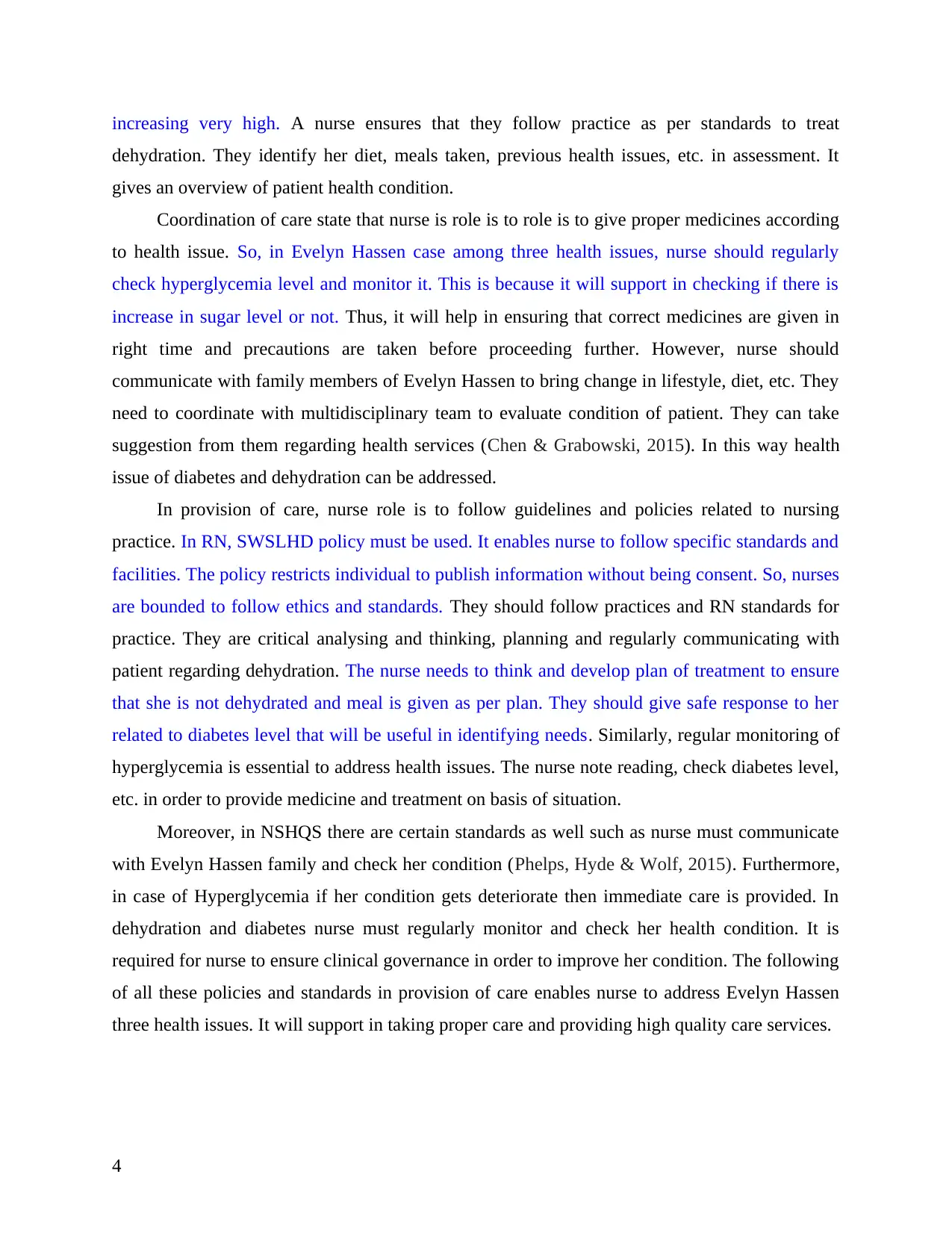
increasing very high. A nurse ensures that they follow practice as per standards to treat
dehydration. They identify her diet, meals taken, previous health issues, etc. in assessment. It
gives an overview of patient health condition.
Coordination of care state that nurse is role is to role is to give proper medicines according
to health issue. So, in Evelyn Hassen case among three health issues, nurse should regularly
check hyperglycemia level and monitor it. This is because it will support in checking if there is
increase in sugar level or not. Thus, it will help in ensuring that correct medicines are given in
right time and precautions are taken before proceeding further. However, nurse should
communicate with family members of Evelyn Hassen to bring change in lifestyle, diet, etc. They
need to coordinate with multidisciplinary team to evaluate condition of patient. They can take
suggestion from them regarding health services (Chen & Grabowski, 2015). In this way health
issue of diabetes and dehydration can be addressed.
In provision of care, nurse role is to follow guidelines and policies related to nursing
practice. In RN, SWSLHD policy must be used. It enables nurse to follow specific standards and
facilities. The policy restricts individual to publish information without being consent. So, nurses
are bounded to follow ethics and standards. They should follow practices and RN standards for
practice. They are critical analysing and thinking, planning and regularly communicating with
patient regarding dehydration. The nurse needs to think and develop plan of treatment to ensure
that she is not dehydrated and meal is given as per plan. They should give safe response to her
related to diabetes level that will be useful in identifying needs. Similarly, regular monitoring of
hyperglycemia is essential to address health issues. The nurse note reading, check diabetes level,
etc. in order to provide medicine and treatment on basis of situation.
Moreover, in NSHQS there are certain standards as well such as nurse must communicate
with Evelyn Hassen family and check her condition (Phelps, Hyde & Wolf, 2015). Furthermore,
in case of Hyperglycemia if her condition gets deteriorate then immediate care is provided. In
dehydration and diabetes nurse must regularly monitor and check her health condition. It is
required for nurse to ensure clinical governance in order to improve her condition. The following
of all these policies and standards in provision of care enables nurse to address Evelyn Hassen
three health issues. It will support in taking proper care and providing high quality care services.
4
dehydration. They identify her diet, meals taken, previous health issues, etc. in assessment. It
gives an overview of patient health condition.
Coordination of care state that nurse is role is to role is to give proper medicines according
to health issue. So, in Evelyn Hassen case among three health issues, nurse should regularly
check hyperglycemia level and monitor it. This is because it will support in checking if there is
increase in sugar level or not. Thus, it will help in ensuring that correct medicines are given in
right time and precautions are taken before proceeding further. However, nurse should
communicate with family members of Evelyn Hassen to bring change in lifestyle, diet, etc. They
need to coordinate with multidisciplinary team to evaluate condition of patient. They can take
suggestion from them regarding health services (Chen & Grabowski, 2015). In this way health
issue of diabetes and dehydration can be addressed.
In provision of care, nurse role is to follow guidelines and policies related to nursing
practice. In RN, SWSLHD policy must be used. It enables nurse to follow specific standards and
facilities. The policy restricts individual to publish information without being consent. So, nurses
are bounded to follow ethics and standards. They should follow practices and RN standards for
practice. They are critical analysing and thinking, planning and regularly communicating with
patient regarding dehydration. The nurse needs to think and develop plan of treatment to ensure
that she is not dehydrated and meal is given as per plan. They should give safe response to her
related to diabetes level that will be useful in identifying needs. Similarly, regular monitoring of
hyperglycemia is essential to address health issues. The nurse note reading, check diabetes level,
etc. in order to provide medicine and treatment on basis of situation.
Moreover, in NSHQS there are certain standards as well such as nurse must communicate
with Evelyn Hassen family and check her condition (Phelps, Hyde & Wolf, 2015). Furthermore,
in case of Hyperglycemia if her condition gets deteriorate then immediate care is provided. In
dehydration and diabetes nurse must regularly monitor and check her health condition. It is
required for nurse to ensure clinical governance in order to improve her condition. The following
of all these policies and standards in provision of care enables nurse to address Evelyn Hassen
three health issues. It will support in taking proper care and providing high quality care services.
4
Paraphrase This Document
Need a fresh take? Get an instant paraphrase of this document with our AI Paraphraser
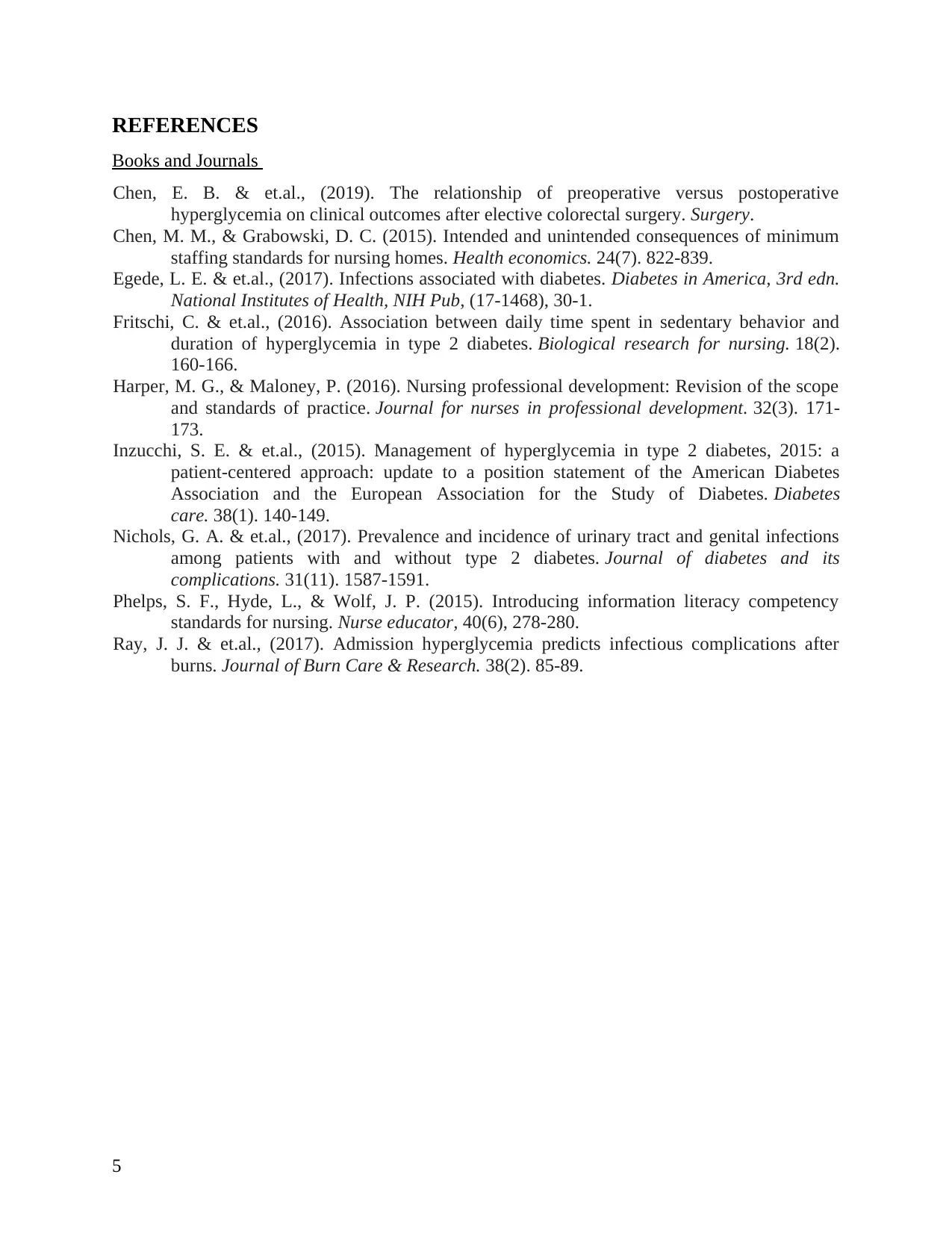
REFERENCES
Books and Journals
Chen, E. B. & et.al., (2019). The relationship of preoperative versus postoperative
hyperglycemia on clinical outcomes after elective colorectal surgery. Surgery.
Chen, M. M., & Grabowski, D. C. (2015). Intended and unintended consequences of minimum
staffing standards for nursing homes. Health economics. 24(7). 822-839.
Egede, L. E. & et.al., (2017). Infections associated with diabetes. Diabetes in America, 3rd edn.
National Institutes of Health, NIH Pub, (17-1468), 30-1.
Fritschi, C. & et.al., (2016). Association between daily time spent in sedentary behavior and
duration of hyperglycemia in type 2 diabetes. Biological research for nursing. 18(2).
160-166.
Harper, M. G., & Maloney, P. (2016). Nursing professional development: Revision of the scope
and standards of practice. Journal for nurses in professional development. 32(3). 171-
173.
Inzucchi, S. E. & et.al., (2015). Management of hyperglycemia in type 2 diabetes, 2015: a
patient-centered approach: update to a position statement of the American Diabetes
Association and the European Association for the Study of Diabetes. Diabetes
care. 38(1). 140-149.
Nichols, G. A. & et.al., (2017). Prevalence and incidence of urinary tract and genital infections
among patients with and without type 2 diabetes. Journal of diabetes and its
complications. 31(11). 1587-1591.
Phelps, S. F., Hyde, L., & Wolf, J. P. (2015). Introducing information literacy competency
standards for nursing. Nurse educator, 40(6), 278-280.
Ray, J. J. & et.al., (2017). Admission hyperglycemia predicts infectious complications after
burns. Journal of Burn Care & Research. 38(2). 85-89.
5
Books and Journals
Chen, E. B. & et.al., (2019). The relationship of preoperative versus postoperative
hyperglycemia on clinical outcomes after elective colorectal surgery. Surgery.
Chen, M. M., & Grabowski, D. C. (2015). Intended and unintended consequences of minimum
staffing standards for nursing homes. Health economics. 24(7). 822-839.
Egede, L. E. & et.al., (2017). Infections associated with diabetes. Diabetes in America, 3rd edn.
National Institutes of Health, NIH Pub, (17-1468), 30-1.
Fritschi, C. & et.al., (2016). Association between daily time spent in sedentary behavior and
duration of hyperglycemia in type 2 diabetes. Biological research for nursing. 18(2).
160-166.
Harper, M. G., & Maloney, P. (2016). Nursing professional development: Revision of the scope
and standards of practice. Journal for nurses in professional development. 32(3). 171-
173.
Inzucchi, S. E. & et.al., (2015). Management of hyperglycemia in type 2 diabetes, 2015: a
patient-centered approach: update to a position statement of the American Diabetes
Association and the European Association for the Study of Diabetes. Diabetes
care. 38(1). 140-149.
Nichols, G. A. & et.al., (2017). Prevalence and incidence of urinary tract and genital infections
among patients with and without type 2 diabetes. Journal of diabetes and its
complications. 31(11). 1587-1591.
Phelps, S. F., Hyde, L., & Wolf, J. P. (2015). Introducing information literacy competency
standards for nursing. Nurse educator, 40(6), 278-280.
Ray, J. J. & et.al., (2017). Admission hyperglycemia predicts infectious complications after
burns. Journal of Burn Care & Research. 38(2). 85-89.
5

6
⊘ This is a preview!⊘
Do you want full access?
Subscribe today to unlock all pages.

Trusted by 1+ million students worldwide
1 out of 6
Related Documents
Your All-in-One AI-Powered Toolkit for Academic Success.
+13062052269
info@desklib.com
Available 24*7 on WhatsApp / Email
![[object Object]](/_next/static/media/star-bottom.7253800d.svg)
Unlock your academic potential
Copyright © 2020–2026 A2Z Services. All Rights Reserved. Developed and managed by ZUCOL.





